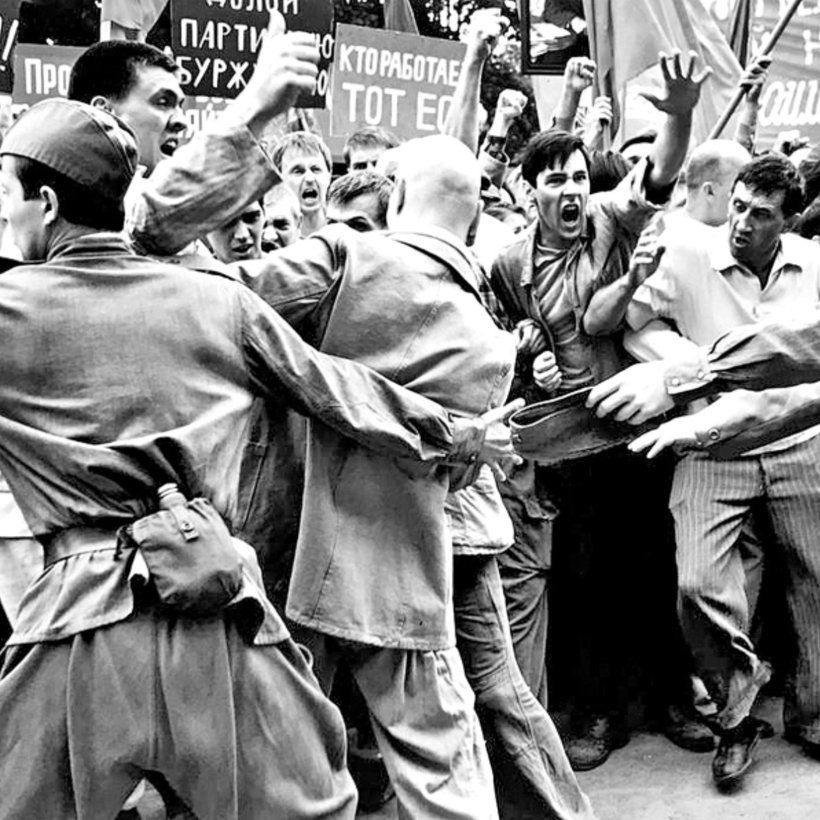Andrei Konchalovsky happily admits to being a casting director’s nightmare. “I prefer not to work with professional actors,” he said in a recent video call from Moscow, “and to use, as much as possible, faces from the streets.” The Russian filmmaker has always had a thing about faces. His requirement for his latest movie, Dear Comrades!, was to find Soviet-looking faces, similar to those which adorned the Communist posters of the 1960s.
It was worth the extra effort. At the age of 83, Konchalovsky has scored possibly the biggest critical hit of his long career, which has included a stint in Hollywood directing thrillers such as Tango & Cash and Runaway Train. Dear Comrades!, available for streaming through virtual cinemas, received the Special Jury Prize at last year’s Venice Film Festival and is Russia’s entry for the upcoming Academy Awards. It explores events surrounding the 1962 massacre of 26 striking factory workers in the city of Novocherkassk, in southern Russia.

Konchalovsky describes the black-and-white movie, which he co-wrote with Elena Kiseleva, as “basically a diary of my memories as a young Soviet man.” Not that he was in Novocherkassk at the time, but he suffered from the feelings of dread that accompanied the epoch. “I knew exactly what I shouldn’t say at any time,” he says. “That’s important, because during that era, political correctness was dramatic in the Soviet Union.”
The filmmaker was inspired to make Dear Comrades! after watching his wife, Julia Vysotskaya, play Antigone on the stage. “I thought that the Novocherkaask clash could be a fantastic background for a tragic character,” Konchalovsky says. In the film, Vysotskaya, herself born in Novocherkassk, plays a Communist Party official who was a frontline nurse during World War II and still burns for Stalin. But her old Communist beliefs begin to falter when her teenage daughter goes missing during the massacre.
“The whole film is about fear,” Konchalovsky says. “It is a very soft violence, of society over a human’s consciousness, like having to sign an affidavit under threat of a death penalty so that you’ll never speak about the massacre.” Reaction to the film in Russia, where it was released last November, has been predictably scabrous. “It has created havoc among both liberals and Stalinists because the Stalinists said it was anti-Soviet and the liberals said it was Stalinist,” Konchalovsky explains.

It’s tempting to compare the ambivalence of Dear Comrades! to another film that Konchalovsky has coming out in the U.S., on February 19. Sin, again scripted with Kiseleva, is a biopic about Michelangelo’s struggle to continue making art when fame became a millstone. It too tangles with questions of self-perception and the obliteration of long-held beliefs.
Sin avoids the usual difficulty of portraying a struggling artist at work by never having Michelangelo—played with hobgoblin verve by Alberto Testone—pick up a chisel. “I wanted to make a film about the genius that lives in the bloody times of the Renaissance,” Konchalovsky says. “It is about how life impedes you to be creative.”
Dear Comrades! and Sin were both bankrolled by the Uzbek billionaire Alisher Usmanov, whom Konchalovsky compares to a Renaissance patron. “When the Medici worked with Michelangelo, they never thought about recuperating their investment,” he said. “Alisher is one of the crazy men that can afford to follow his curiosity.”
Dear Comrades! is available for streaming on Neon
Tobias Grey is a Gloucestershire-based writer and critic


 Discover
Discover